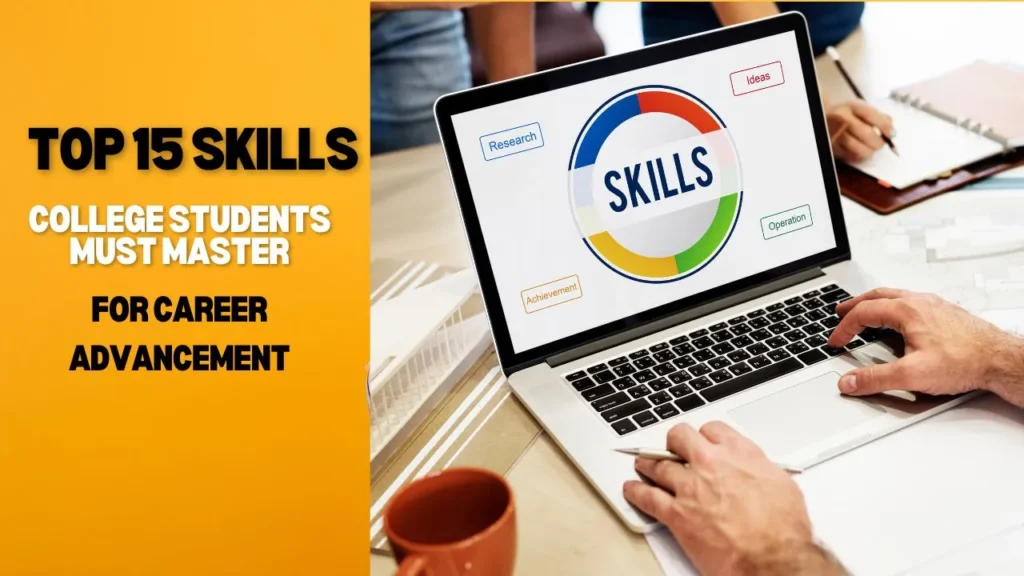
As a college or university student, your educational journey is more than just about grades. It’s about preparing yourself for a successful career in a fast-evolving job market. To stand out and shine in your future career, there are Top 15 Skills College Students Must Master for Career Advancement for college and university students that will help accelerate your career advancement. By focusing on developing key abilities such as computer proficiency, English communication, personal finance management, critical thinking, and leadership, you will set yourself up for long-term success. These skills will not only help you excel in your studies but will also provide you with a competitive edge when you enter the workforce.
In this article, we’ll delve deep into these 15 essential skills for career advancement, how they play a pivotal role in professional growth, and why they are necessary for students who aspire to succeed in the modern job landscape.
- Computer Proficiency: The Backbone of Career Success
In today’s digital era, computer proficiency is no longer optional it’s a requirement. Whether you are working in marketing, engineering, or healthcare, computer literacy is fundamental for almost every career path. Students who are adept at using tools such as Microsoft Office Suite, Google Workspace, and project management software like Trello or Asana will have a significant advantage.
Additionally, understanding basic programming, data analysis, and digital tools specific to your field (e.g., Photoshop for design, SQL for data management) is increasingly important. Being computer proficient not only boosts your employability but also shows potential employers that you are adaptable and tech-savvy.
- English Communication: Key to Professional Success
Effective English communication skills are a must for any student who aspires to advance their career. Whether it’s writing professional emails, crafting reports, or presenting your ideas, the ability to communicate clearly and persuasively is invaluable. Strong verbal and written communication helps you interact with peers, professors, and future employers.
If you’re aiming for a job in a global marketplace, English is often the default language of business. Mastering English communication will help you excel in job interviews, networking events, and collaborative projects. It also demonstrates your ability to work in diverse and multicultural environments.
- Personal Finance Management: Master Your Money Early
Understanding personal finance management is essential for long-term career success and stability. Students who are financially savvy—managing budgets, understanding credit, and saving—set themselves up for a smooth transition from college to the professional world.
Learning how to manage personal finances not only alleviates stress but also improves overall quality of life, allowing you to focus on academic and career goals without being overwhelmed by debt. This skill is invaluable as you navigate through internships, part-time jobs, and full-time career opportunities.
- Presentation Skills: Captivate and Influence
Being able to present your ideas effectively is a key skill that will take you far in your career. Whether it’s presenting to a professor, leading a team meeting, or speaking at a conference, strong presentation skills can elevate your personal brand and help you stand out from the crowd.
Effective presentations include clear structure, confidence, and the ability to engage your audience. Mastering the art of presentation skills is crucial for leadership roles and will enhance your ability to pitch ideas, products, or services in a business setting.
- Interpersonal Relations: Building Strong Professional Connections
No matter your field, the ability to connect with people is critical for career advancement. Interpersonal relations encompass empathy, emotional intelligence (EQ), and the ability to build and nurture professional relationships. Being personable and approachable helps you establish a strong network, which can be a valuable resource in your career.
These skills are crucial in teamwork environments and leadership roles. The better you are at working with others, the more likely you are to climb the corporate ladder.
- Critical Thinking and Problem Solving: Your Toolkit for Career Success
Employers seek individuals who can think critically and solve complex problems. Critical thinking involves analyzing situations, evaluating options, and making informed decisions. Coupled with problem-solving skills, this ability ensures you can tackle challenges in your career with confidence.
Students who excel in critical thinking and problem-solving become valuable assets to any organization. These abilities are especially important in fields like engineering, business, and healthcare, where strategic decision-making is essential.
- Time Management and Organization: Master Your Schedule
One of the most common mistakes students make is failing to manage their time effectively. Time management and organization skills are essential for balancing coursework, extracurricular activities, and internships. By developing a system for prioritizing tasks, setting goals, and maintaining productivity, you can manage your responsibilities and reduce stress.
Employers highly value students who can demonstrate time management and organizational skills because these abilities show self-discipline, reliability, and an ability to meet deadlines.
- Adaptability and Resilience: Thriving in a Changing Job Market
The ability to adapt to new environments, technologies, and challenges is a critical skill in today’s fast-paced world. Adaptability and resilience go hand in hand, helping you overcome setbacks and remain focused on your goals. These skills are essential for career advancement, as industries continue to evolve and job roles become more dynamic.
Students who embrace change and are resilient in the face of obstacles will be better equipped to handle challenges and remain competitive in their chosen field.
- Networking and Relationship Building: Your Career Connections
Building a strong network is one of the most effective ways to advance your career. Networking and relationship building open doors to opportunities and provide support throughout your career journey. By attending career fairs, joining clubs, and connecting with alumni, you can expand your network and gain valuable insights from professionals in your field.
Strong professional relationships are often key to finding job leads, mentorship, and collaborative opportunities that accelerate career growth.
- Collaboration and Teamwork: Success is a Team Effort
In the workplace, most projects require collaboration. The ability to work well in a team is essential for career advancement. Whether in group assignments at university or in a corporate environment, collaboration and teamwork help you achieve goals faster and more efficiently.
Employers appreciate students who can work effectively with diverse teams, contribute ideas, and help bring out the best in others.
- Digital Literacy and Cybersecurity Awareness: Protect Your Future
With the increasing reliance on digital platforms, digital literacy and understanding cybersecurity are critical. This includes knowing how to safely use online tools, protect personal data, and understand potential threats in the digital world.
Having a strong grasp of digital literacy and cybersecurity awareness will make you an attractive candidate to employers who prioritize data protection and digital integrity.
- Emotional Intelligence (EQ): Manage Emotions for Career Success
Emotional intelligence (EQ) plays a vital role in career advancement. It allows you to manage your emotions, empathize with others, and handle workplace dynamics effectively. Students with high EQ excel in leadership roles, team interactions, and conflict resolution.
Developing your emotional intelligence is crucial for building strong professional relationships and effectively managing stress in high-pressure environments.
- Self-Discipline and Motivation: Stay Focused on Your Goals
Career success requires sustained effort over time. Self-discipline and motivation are key to pushing through obstacles, staying focused on long-term goals, and maintaining productivity in the face of distractions. Students who exhibit self-control and intrinsic motivation are more likely to succeed in their studies and future careers. - Leadership and Management Skills: Lead with Confidence
As you progress in your career, leadership becomes increasingly important. Leadership and management skills enable you to inspire and guide teams, make decisions, and contribute to organizational success. Students who develop these skills in college are often seen as future leaders in their industries.
Whether through extracurricular leadership positions or group projects, honing leadership and management skills sets the foundation for future career growth.
- Cultural Awareness and Diversity Sensitivity: Global Mindset for Career Growth
In a globalized world, employers value employees who are culturally aware and sensitive to diversity. Cultural awareness and diversity sensitivity allow you to work effectively in international teams, understand different perspectives, and navigate multicultural environments with ease. These skills are essential for career advancement, especially for those working in multinational companies.
How to Develop These 15 Essential Skills for Career Advancement
As you embark on your college or university journey, developing these Top 15 Skills College Students Must Master for Career advancement will help you stand out in the competitive job market. By focusing on skills like computer proficiency, communication, leadership, and problem-solving, you’ll be setting the stage for long-term success in your career.
Remember, these Top 15 Skills College Students Must Master for Career Advancement are crucial for long-term success. Continuous improvement and learning are key to career growth. Take advantage of your time at college to actively develop these skills, and you’ll be well-prepared for a thriving and successful career.


